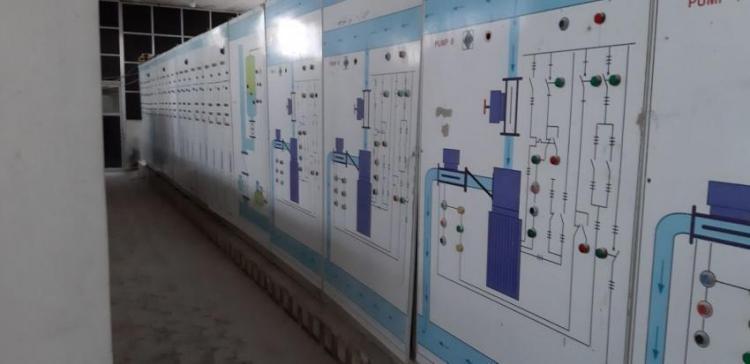Turkey again cuts water supply to northeastern Syria for eighth time
QAMISHLI, Syria (North Press) – Turkish-backed Syrian opposition armed groups on Friday cut the flow from a reservoir that supplies water to areas in northeastern Syria’s Hassakah province that are controlled by the Kurdish-led Syrian Democratic Forces (SDF), depriving some 500,000 people in the region of the essential resource.
Locals in Hassakah said they had to buy water from few tanks touring in the city and the countryside.
“Even if you want to buy water, it’s not available and moreover it’s not clean,” an internal displaced person living in the city said.
Sozdar Ahmed, co-chair of the directorate of Potable Water in the city of Hassakah said in an earlier interview it was assumed that Russia was the guarantor of supplying the city with water, but they did not play their role well.
“There are no guarantees regarding the continuation of water pumping from Alouk station, which is under the control of the Turkish army and its Syrian opposition groups, as it continuously cuts it” she said.
The Russian military brokered a deal with the Turkish army in December to guarantee drinking water to Kurdish-held areas in exchange for power supply.
Following Russian mediation, northeastern Syria has been providing electricity to the Turkish-occupied areas in exchange for water flow.
However, since then Turkey has been regularly cutting off the water flow in order to demand that North and East Syria provides more and more electricity.
Alouk Water Station is near the border town of Serekaniye, which Turkey and its militant proxies took over in October 2019 during Turkey’s so-called Peace Spring Operation.
Turkish-backed groups have repeatedly cut off the supply since October expelling workers from the station as leverage to demand that Kurdish-led local authorities in northeast Syria provide increased electricity to areas under their control before allowing the water to flow again.
According to the Syrian Observatory for Human Rights (SOHR), it was only restored to Hassakah on March 6 after the Kurdish-led Autonomous Administration in Northeastern Syria (AANES) provided more electricity to the Turkish-controlled areas through the Mabrouka Power Plant.
But now, the Turkish-backed groups are demanding even more electricity before turning the water back on.
As a result, there is no water for hundreds of thousands of civilians, including thousands of displaced civilians, refugees, and families and fighters of the so-called Islamic State holed up in camps and prisons, respectively.
All of these populations are at extremely high risk of coronavirus, according to AANES Health Board currently modeling a 10% death rate in the camps and detention centers due to pre-existing spread of tuberculosis and other diseases there.
In order to deal with the crisis, AANES has said it will distribute water to residents through tankers and will also dig wells for home use. In February, the Kurdish-led SDF also deployed tankers for this purpose.
On March 23, UNICEF Representative in Syria Fran Equiza said the interruption “during the current efforts to curb the spread of the coronavirus disease puts children and families at unacceptable risk.”
Her sentiment echoed those of some vocal German officials and groups like Human Rights Watch (HRW), which warned in late March that “Turkish authorities’ failure to ensure adequate water supplies to Kurdish-held areas in Northeast Syria is compromising humanitarian agencies’ ability to prepare and protect vulnerable communities in the COVID-19 pandemic.”
On March 27, 49 Syrian civil society and human rights organizations also condemned the water interruption in a jointly signed statement.
“This intentional denial of water that the residents of these areas are suffering is a blatant violation of international humanitarian law and is a war crime,” the statement read.
The organizations called on UN agencies, as well as the United States and the European Union, to “pressure the Turkish Government to allow the provision of water to deprived areas.”

